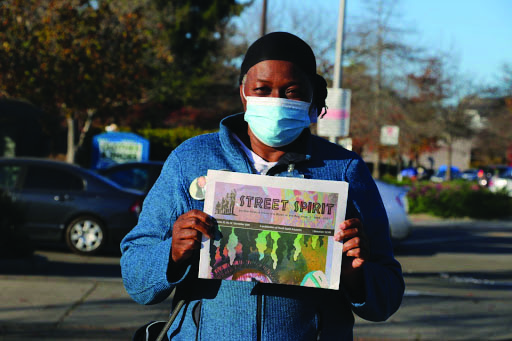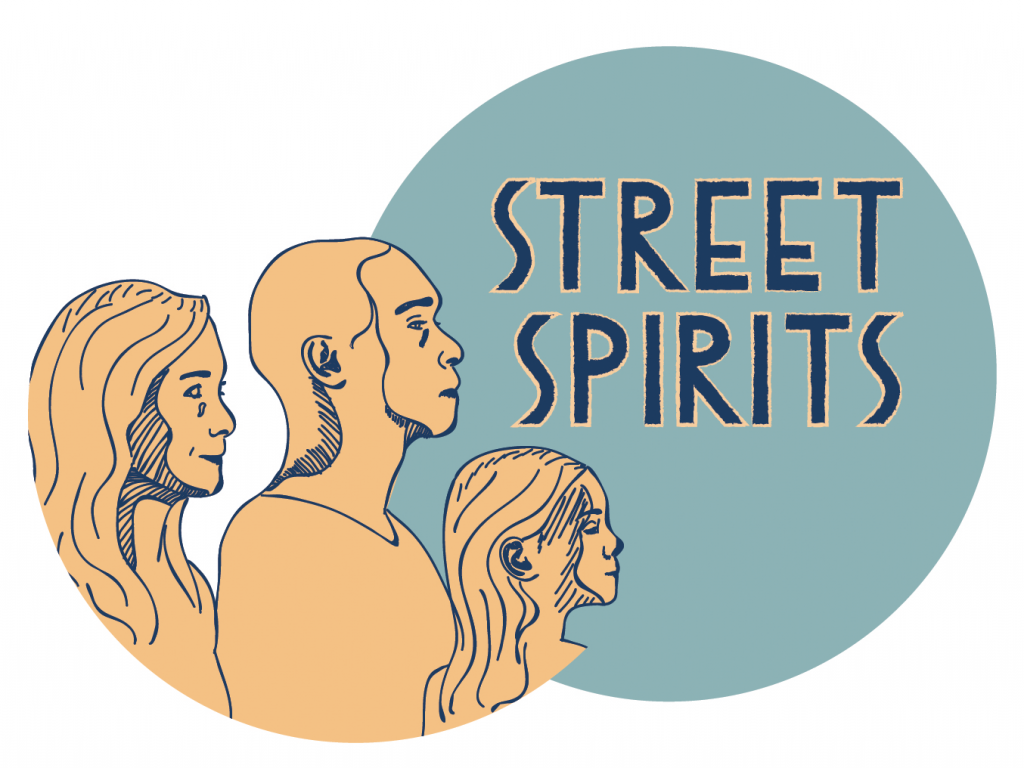

If there were ever a person who embodied relentless curiosity and persistence, it would be lifelong Oakland resident Vinola Stallings. Anyone who has encountered her selling Street Spirit knows that Vinola means business. An unhoused woman with several part-time jobs across the Bay, she often travels from Berkeley to Fairfax with all her belongings. She lines them up beside her as she patiently flags down Berkeley Bowl patrons and asks if they would like to purchase a paper. “Some people, you have to ask them, because it looks like a lot of them have tunnel vision and they’re thinking about what they need to do in the store,” shared Stallings. “Sometimes it seems like they need to be reminded that ‘hey I’m here, here’s a paper—you may be interested in it,’ but [their] mind is just focused on something else.”
In the 20 years that Vinola has been unhoused, she has worked hard to develop her time management and organizational skills as well as her involvement and investment into her community.
Stallings was born and raised on Church Street in East Oakland until she was seven. At that point, her family began moving between several Oakland neighborhoods until they found a house on Wentworth Avenue when she was nine. She lived with her sister and two half brothers, and her mom, Suzanne Warfield. Warfield, also a lifelong Oakland resident, worked as a nursing assistant until she had to retire to take care of Vinola’s grandmother. Vinola remembers her neighborhoods being quiet and very solitary.
After having her daughter Shonte’ at 18 years old, Stallings went on to work as a nursing assistant and an at home caretaker. She worked in this profession for years until her nursing assistant clientele dried up and she was officially let go in 1998. Stallings was supported by her mother and other immediate family members for a handful of years before she reached a point where her best option was going to a shelter.
“I had this still independent kind of mind back then—like I could go to work and pay my rent—but in reality I don’t have a job, I had nowhere to live,” Stallings recounted. “I still had it in my mind that I was independent, because I had been independent for years.”
For several years she cycled between shelters, which she said were far from ideal in terms of being able to secure a job, support herself, and move towards earning a consistent living wage. During her time moving between shelters and temporary housing, she struggled to grasp her new reality.
“It was hard for me—the idea of being homeless with no job—to have it sink in. I would leave when things weren’t right in the shelter and then realize I had to go back because I didn’t have anyone to stay with,” said Stallings. “You can get in a rut like that and time just keeps going by.”
During her time shelter-hopping, she struggled to apply to and maintain jobs due to the conditions of living and working from group shelters, as well as a growing gap in her work history.
“I realized that I didn’t have the tools that I needed. I didn’t have references and I didnt have a recent work history,” said Stallings.
These days, Vinola avoids shelters when she can. Instead she splits her time between riding the bus and saving up to book hotel rooms, with the goal of building points for free stays in the future. She feels that this arrangement has enabled her to seek out consistent and reliable work, allowing her to begin building her work experience, her resume, and her income. Her ultimate goal is to move toward securing quality, reliable housing to share with her daughter and grandchildren one day.
When it comes to finding a job, Stallings has had a few promising successes. In August of 2019 she began working regularly with the Downtown Streets Team (DST) and taking on regular shifts completing street cleaning and beautification projects. Through DST, Vinola has been able to receive a basic needs stipend, work references, and case management. Soon after securing her job with DST, Stallings applied for an on-call position cleaning shelter suites at St. Vincent de Paul, and also started receiving house cleaning jobs through Nextdoor—the neighborhood-based social networking app. The housecleaning was going well until she realized her government-provided phone was not reliable enough to enable her to be a good employee. This specifically became an issue when she made the effort of distributing flyers advertising her cleaning services for hire with her phone number listed as a reference, but could not reliably make or receive calls
Vinola then began work as a Street Spirit vendor as well. She enjoys the opportunity her work has provided to spend more time in Berkeley and other culturally diverse areas of the Bay. During her childhood, Stallings noted that her neighborhood lacked the sense of cultural diversity, community, and exchange due to the heavily segregated nature of the Bay Area. She cites her own family’s lack of structure, support, and kinship during her childhood as a contributing factor to her homelessness, as well as having so few family members with whom she could stay when she first lost her job and in the years since.
“If I were close to people [family] and knew them and was raised with them, maybe I wouldn’t be in this homeless situation when I didn’t have a job,” said Stallings. “That’s a harsh realization—it takes time to get to know people.”
Under that guiding principle, she is driven by the goal of reuniting with, and providing for, her family. She is exceptionally proud of her daughter Shonte’ for her educational pursuits and success, as well as her granddaughters Brejae’ and Sole’ and her niece Eeshanna for their commitment to school and their good grades.
Street Spirits is a feature in which someone who lives on the street tells us their story.
Sabrina Armaghan Kharrazi is a graduate student at UC Berkeley’s School of Journalism and a former staff member of the Women’s Daytime Drop-In Center in Berkeley.
